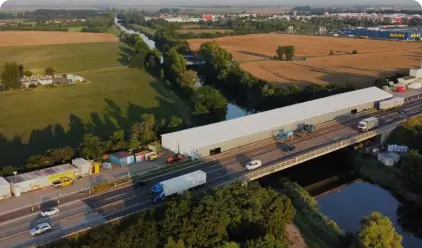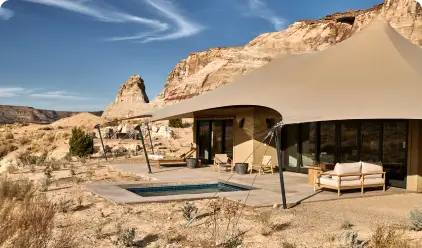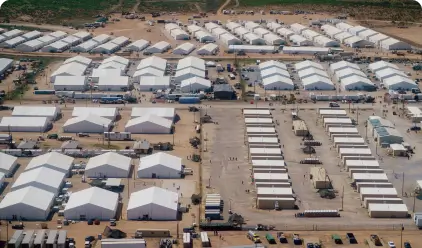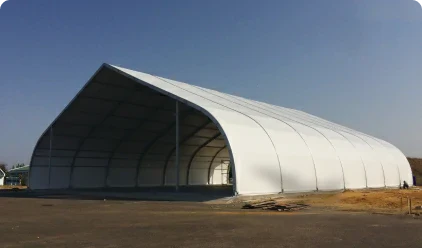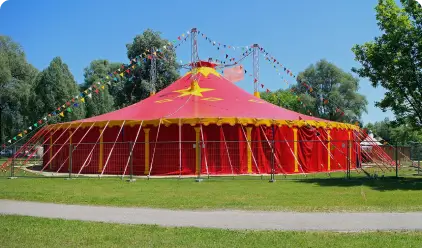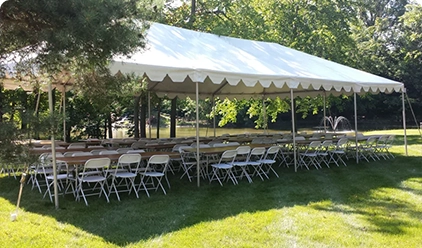Tent Fabric: How to Choose and What's the Fabric Specs?
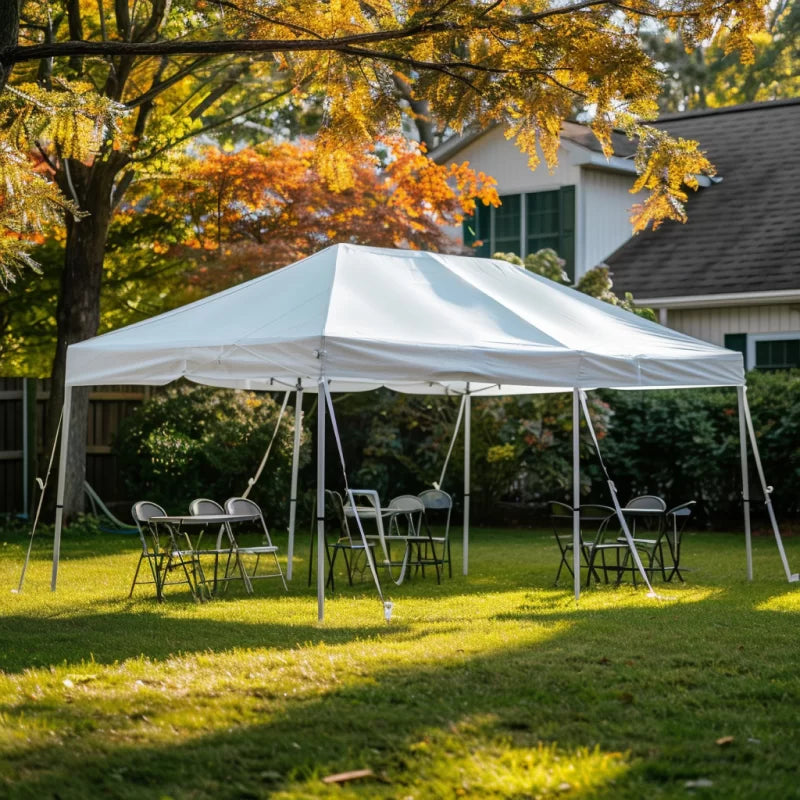
Tents are mainly made up of strong frames and durable fabrics. Common tent fabrics are nylon, canvas, and so on. We all know that one thing to consider when choosing a tent is tent fabric, and it is the fabric that mainly affects the performance of the tent.
So do you know the meaning of those numbers on the specification label of the tent fabric? It's not too late to know. Here we will take you through the tent fabric specification and how it affects the tent fabric to help you choose the tent fabric to buy your tent.
🎈You May Also Read: How Long Do Tents Last? How to Make It Serve Longer?
What Is Tent Fabric?
Actually, those tents that look like they're just made of nylon or polyester have more complex production processes than you might think. So we need to know the answer to the question first: What is tent fabric made of?
The tent material fabric is usually made up of a layer of base cloth with coating and through surface treatment. The base cloth is the main structure of the fabric and plays an important role in the tensile strength and abrasion resistance of the fabric. The nylon or polyester you see is it.
After coating treatment on the base cloth, the fabric will be waterproof, sunscreen, wear-resistant, anti-corrosion, and other properties. The tent's UV resistance, mold resistance, and self-cleaning ability are related to surface treatment.
Why Tent Fabric Specs Matter?
Now that you've had a better look at tent fabric, it's time to get to grips with fabric specifications. We will explain these technical terms in simple words, and help you understand the tent specifications and why they are important so that you can find the best tent fabric that is hard-wearing and durable.
Denier (D)
Denier is a unit of measurement of the thickness of a fiber, and its value may affect the abrasion and tear resistance of the material. Higher values indicate thicker and stronger fibers; conversely, fibers with lower denier values are lighter and softer.
Lower-denier is commonly used in ultralight nylon tents, emphasizing the lightweight and making them suitable for short hikes. While higher-denier tents (70D and above) are heavier, such as the 150D polyester tents which have higher abrasion and tear resistance and are suitable for long-distance camping trips.
For tented commercial events, then a higher Danier fabric such as Sheltent's heavy-duty 990D PVC is required.

Thread Count (T)
Thread count refers to the number of horizontal and vertical threads per square inch of fabric, the sum of which indicates the density of the fabric and the tightness of the weave. For example, 210T means a total of 210 threads per square inch.
Typically, a higher thread count means a denser fabric. Generally speaking, low-denier fibers may be used in high Thread Count fabrics, as the finer fibers can be woven more in the same space, thus increasing the Thread Count.
However, a higher thread count doesn't always mean a stronger fabric. The strength of a fabric depends not only on the thread count but also on the type and thickness of the fibers.
Waterproof Ratings
The waterproof rating indicates the height of the water column it can withstand before water leaks through. For example, a 1500 mmH₂O rating means that the fabric can withstand a water column pressure of up to 1500 mm before leakage occurs.
Waterproofness is usually assessed using a high water column test, with grades ranging from 800 mm to a maximum of 10,000 mm. Fabrics with a rating of 1,500 mm and above are generally considered to be 'waterproof tent fabrics'.
It is important to note that a higher waterproof rating does not always mean that the fabric is durable. For example, TPU membranes have excellent waterproofing properties but are relatively thin and easily damaged by high friction or pulling.

Flame Retardant
Flame retardant standards are used to assess the reactivity of fabrics in the event of flame contact. Flame-retardant standards are usually indicated on tent labels or instructions, and you can use this information to select tents.
At Sheltent, our tents meet the international flame retardant standard DIN 4102 B1, and can effectively reduce the risk of fire, especially when glamping or holding events outdoors.
Types of Tent Fabric
After knowing what the letters and numbers on the tent label mean, let's look at seven common tent fabrics.
Nylon
Nylon is a lightweight and commonly used material that is one of the most affordable tent options on the market. It offers a good strength-to-weight ratio and abrasion resistance while being relatively inexpensive. However, nylon is prone to degradation from UV exposure.

Polyester
Polyester is a relatively inexpensive and durable tent material fabric that offers a variety of coating options. It typically has a lower tear strength than nylon, which is similar in weight.
Polyester tents do not shrink or become heavy when in contact with water and are not easily affected by sunlight. Choose a polyester tent with a coating that will provide adequate ventilation while preventing moisture from getting through.

Cuben Fiber (Dyneema)
Cuben Fiber is a new tent fabric also known as Dyneema Composite Fabric (DCF). It is not a fabric in the traditional sense, but a composite material with an optimal strength-to-weight ratio.
Despite its higher cost, it is very waterproof and easy to repair. Since it is not yet well known to the general public, its applications are relatively niche.
PVC-coated Fabric
PVC-coated fabric enhances properties by coating the base cloth with PVC. This PVC coating is commonly applied to various types of fabrics including polyester and nylon to provide better water resistance, abrasion resistance, and UV resistance.
PVC-coated fabrics are widely used in applications such as tents, rain gear, banners, and industrial purposes for their durability and ease of cleaning. It is suggested that you buy a PVC-coated fabric tent with good ventilation that keeps out condensation.

PE-coated Fabric
PE-coated fabrics have good abrasion and tear resistance and are suitable for outdoor equipment, tents, rain gear, and other products that require waterproof protection.
While PE coating is relatively economical, it is less breathable and can lead to internal moisture build-up. In addition, PE coatings have limited resistance to UV rays, and prolonged exposure to sunlight may cause the coating to degrade.
PU-coated Fabric
PU-coated fabric is a waterproof coating commonly used on polyester and nylon fabrics. It acts like a protective film that adheres to the surface of the tent, providing waterproofing, affordability, and breathability.
However, PU coating may weaken the fabric, tear easily and hydrolyze. It is also affected by UV light and breaks down over time. PU-coated fabrics need to be kept clean and dry when used.
Silicone-coated Fabric
Silicone-coated fabric is usually applied to nylon fabrics, also known as 'silnylon'. This material is widely used in tents and other outdoor equipment because of its lightweight and excellent waterproofing properties.
Due to its UV resistance, silnylon fabrics are more stable than nylon fabrics in sunlight, making them suitable for extended outdoor use.

How to Choose the Best Tent Fabric
If you want to choose the best tent fabric, in addition to knowing the tent material fabric, there are many things you need to consider. Below, we provide you with what you need to be aware of to help you make the right choice.
Price Budget
The first consideration is your price budget. The price of tent fabric varies from the material and characteristics. Nylon usually costs between $10 - $25 per square meter and is lightweight and suitable for backpacking. PVC is more expensive at around $15 - $40 per square meter but is suitable for long-term use due to its durability and waterproof properties.
You can search for tent fabric directly on Amazon, enter your budget range, and then filter the fabrics. We recommend buying a high-quality tent within your budget range; it will reduce the frequency of tent replacement and require less maintenance which will help you save money in the long run.
Fabric Features
You surely don't want to lie in a tent and still get sunburned or rained on... Then you must pay attention to its features when choosing a tent fabric. Each tent has different features, so choose one that suits your needs.
UV Resistance
UV resistance is an important factor. Nylon, for example, has poor UV resistance and bright-colored nylon tends to become brittle and lose strength when exposed to sunlight.
Therefore, if you want to choose nylon fabrics, it is recommended to choose soft tones of nylon to prevent degradation under prolonged sun exposure.
Alternatively, Dyneema is also a good choice with excellent UV resistance that maintains its strength and durability in the sun.
Waterproof
Choosing the right waterproof coating or material can improve the performance and longevity of your tent. Nylon and polyester fabrics are not waterproof, so silicone or PU coatings are usually used to enhance their waterproof capability.
On the other hand, Cuben fiber and PVC materials have excellent waterproofing properties on their own, so they don't need additional waterproof coatings.
Tear Resistance
Tear strength is a key indicator of the durability of tent fabrics, directly affecting their performance in harsh environments. Cuben fiber excels in tear strength, making it suitable for extreme camping. Other tent fabrics, such as polyester, can be enhanced with additional PVC coatings to increase tear resistance.
In addition, good tent construction design can effectively disperse external forces and reduce the risk of tearing.
Durability
The durability of the tent fabric, also known as its longevity, is usually linked to the characteristics of the tent fabric itself. For example, nylon fabrics usually have a life expectancy of around three years, while PVC fabrics have a life expectancy of five years. And, regular cleaning and proper maintenance can extend the life of your tent.
Usages
The higher the waterproof rating of the tent fabric, the thicker the coating and the heavier and stiffer the tent may be. Therefore, you need to find a balance between your budget as well as tent fabric properties such as sun and water resistance, tear resistance, and longevity to choose the right tent. It is suggested that choose tent fabric according to your usage.
- For backpacking, high-density nylon is recommended. It offers a good balance of weight and strength and resists tearing and abrasion.
- For camping holidays, polyester or PU-coated nylon are good choices. Polyester performs well in terms of abrasion resistance and waterproofing, while coated nylon offers extra waterproofing to ensure you stay dry in rainy weather.
- For outdoor parties, high-quality polyester with PVC-coated fabric is more suitable. They can be used frequently to withstand weather changes, and are easy to clean and maintain.
Choose Sheltent Tent Fabric to Enjoy a Reliable Tent Party
Objectively speaking, the PVC fabric used in Sheltent tents is probably the best tent fabric to enjoy a reliable tent party, which blends aesthetics and functionality well at the right price.
Our tents are made from 990D high strength PVC coated polyester fabric. It has an excellent UV coating and is water resistant to ensure comfort in any environment. The fabric complies with international fire safety standards (DIN4102: B1/M2) ensuring the tent is safe to use.
In addition, the tent tops are available in white, clear, or custom colors to suit your event theme or brand logo. Our tents are also available in full shade, semi-shade, and full clear shade ratings.
Conclusion
Hopefully, this information will make a real difference to your choice of tent. Also, a tip for you, check the life expectancy of the tent directly, which is usually trustworthy.
Sheltent's tents use PVC fabrics that last up to 5 years. To further extend the life of your tent, Sheltent also offers a professional cleaning and repair service to ensure your tent is always in top condition. Visit our website today for more information and services!




























